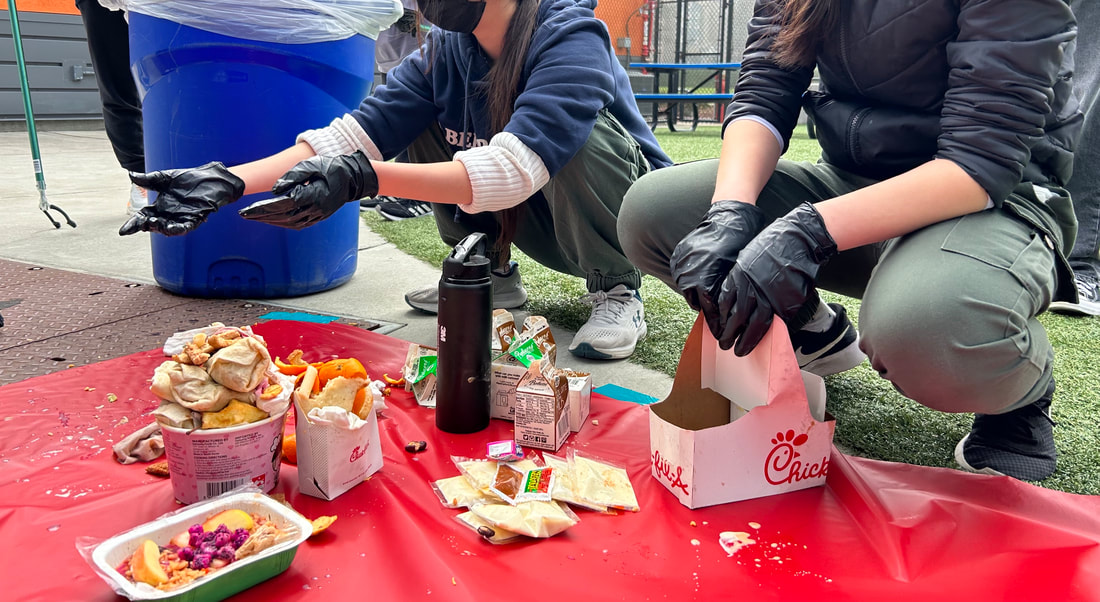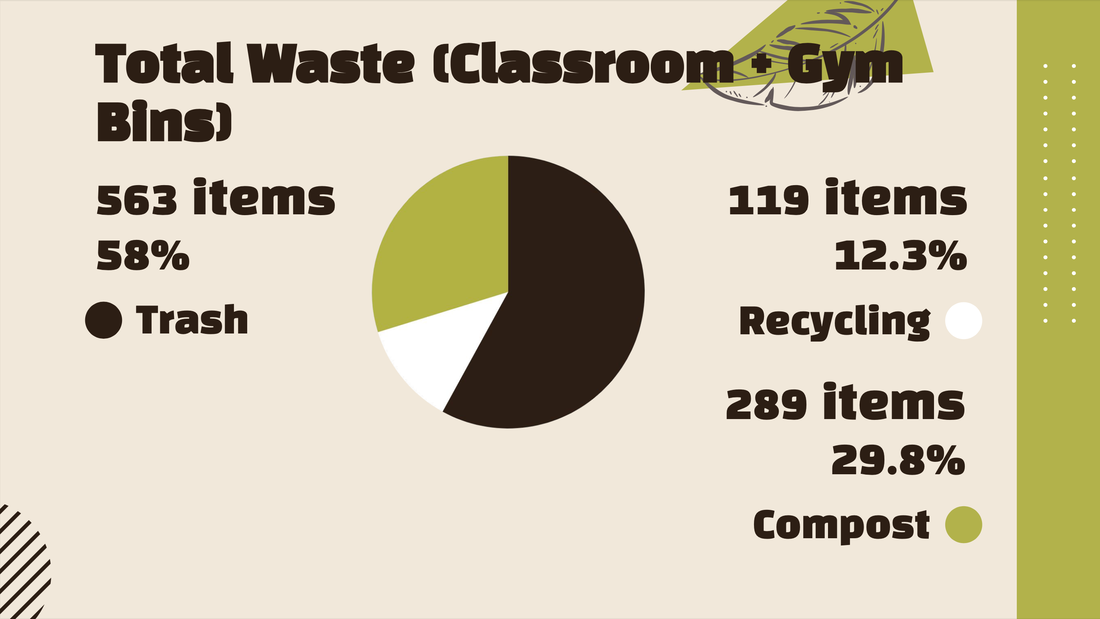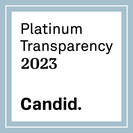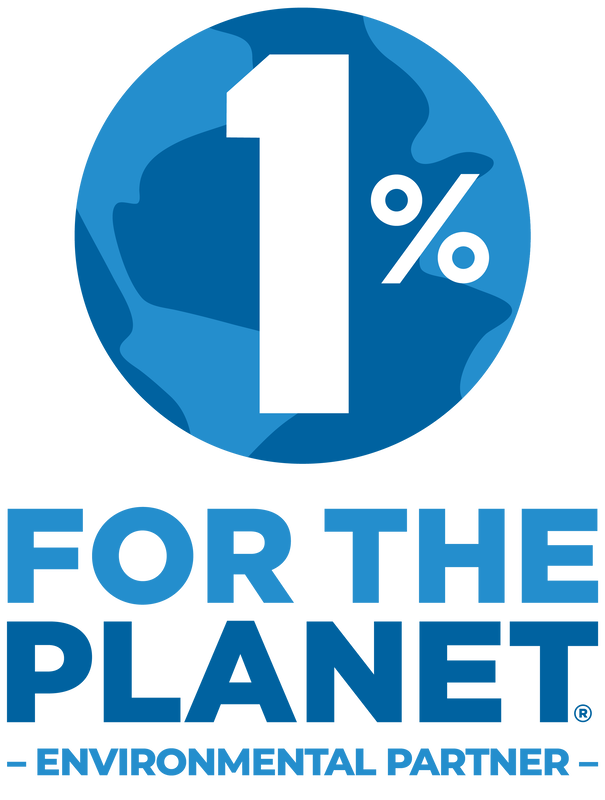|
Spearheaded by their co-leaders, Timothy Lee and Trinity Ly, Summit Shasta‘s Environment Club conducted a four-day waste-sorting audit (seeing what waste could have been recycled or composted rather than thrown into the trash) to educate the school community on the importance of recycling and composting. Their resulting campaign was announced a winner of the of SEI's Earth Day Challenge. Leading a team of 11 volunteers, Timothy and Trinity analyzed waste from their classrooms and from their gym. Everyone on the team got their hands dirty and tangibly took stock of their school’s environmental impact. They geared up in gloves, laid out tarps, and separated waste into three mountainous piles: trash, recycling, and compostables. The results? Nearly 42% of the waste could be composted or recycled. These findings stressed the need for strategically placed and clearly labeled recycling and compost bins throughout campus. While sorting, students also found quite a bit of contaminated material – waste that could’ve been composted or recycled had it been properly cleaned before disposal. Following their successful Earth Day Challenge campaign, which reached 470 members of the school community, Timothy and Trinity provided poignant context to their rationale, learnings, and future plans surrounding their campaign and imparted advice for students launching sustainability initiatives. Excerpts from the interview have been edited for length and clarity.
Why did you focus on waste? What inspired you to create this campaign? Trinity: We noticed systematic problems around how we divert our waste and how students throw it out. It’s harder for students who aren’t part of a club or don’t have the resources to change the waste management system. So it’s really important to us that we have these resources. Timothy: Like Trinity said, the waste system at school was really bad. While we still did check in the recycling bins and trash cans, they were all being regarded as just trash cans. That’s both the fault of the school and the students because the trash cans were poorly placed or poorly labeled [and] students continued to do the bad habits. What did you learn? How do you plan to use your findings? Trinity: We learned not just from the waste audit, but from the overall process that we really need to be patient. Also, when we were talking to representatives from Republic Services to evaluate stuff, we learned that you don’t need a lot of bins. You need bins for specific areas. Our gym created a lot of compost because a lot of people eat there. But the classrooms also created similar trash and compost, so we learned that you just need to strategically place bins. Timothy: When advocating for getting more or different types of waste bins and stuff, it’s a more powerful message when we have percentages and numbers to back it up. This is what the data was pretty useful for. The staff are all on board. Now, it’s just a matter of us trying to figure out how to improve it. We need to buy more recycling and compost bins for outdoors, for example, which is more expensive. What might you be using the reward money for? Trinity: We’ll try to use it pretty evenly. We don’t want to spend it all for the bins we need for the campus. We also want to spend it on volunteers for our club that are a really crucial part of the waste audit. Without volunteers, it would be just me and Timothy digging in the trash. And I think Timothy brought up how we’re trying to get really durable outside bins for parts of our campus. Apparently durable bins are really expensive. Timothy: So we’re kind of in between either putting it toward projects to better our waste management or for the club and the club members. Like Trinity said, our club members are the backbone of us doing stuff. We can’t really do anything alone. We’ve also been considering potential grants we can apply for to get more bins because a thousand dollars is a lot, but it’s not a whole lot. We’re going to need more if we are going to be able to buy more compost and recycling bins. What would you share with other students who would like to create their own campaigns? Trinity: I guess the biggest one is to keep working toward it. You likely won’t succeed the first time. You feel like you don’t see any change, but change will come—just very slowly. You just have to be patient. If people see the effort you are putting in, they will try to help. We passed out a survey before doing the audit. We asked, ‘Do you see the problems within our waste management system?’ And a lot of people were like, ‘Yeah we do, but I don’t know what to do about it,’ or ‘It seems more like an administration problem, or a bigger system we cannot take on as students.’ So you need to keep working and communicating with the admin how important this campaign will be for our school. Keeping up motivation is also really hard, but this is just something you’ve just gotta do. Timothy: I think what she said is great for doing long-term things. To create change takes a long time. For more specific advice on people trying to do things like this is to not do it alone. Get help! Because we wouldn’t have been able to do this without help from our club members or help from adults, like our club advisor at our school. But we also had help from two different organizations with our bins. One was Republic Services, which is our local waste provider/waste collector. We also got more bins from the San Mateo Office of Sustainability. And we also got more help from the Office of Education. If you want to create big change, you need to get people on board—like teachers, admin, or people from other organizations that can give you advice or resources. This is crucial. Trinity: To add on, don’t be scared to contact those bigger organizations like your local waste collector because there are people that want to help you and your community in improving these systems. That’s their job. And a lot of them want to teach people more about how important these campaigns are.
0 Comments
Leave a Reply. |
Get In TouchDo you know an environmental leader who should be featured in a story? Reach out to [email protected]. Categories
All
Archives
April 2024
|
Get Involved
|
Contact Us
|
SEI Headquarters
100 Smith Ranch Road, Suite 124 San Rafael, CA 94903 Phone: (415) 507 - 2181 Email: [email protected] States where we work:
Arizona California Colorado Indiana Maryland New Mexico New York New Jersey North Carolina Oregon Washington Virginia |
ConnectSubscribe to the SEI quarterly newsletter to get involved and receive updates
|
SEI is a 501(c)3 nonprofit organization.



 RSS Feed
RSS Feed

